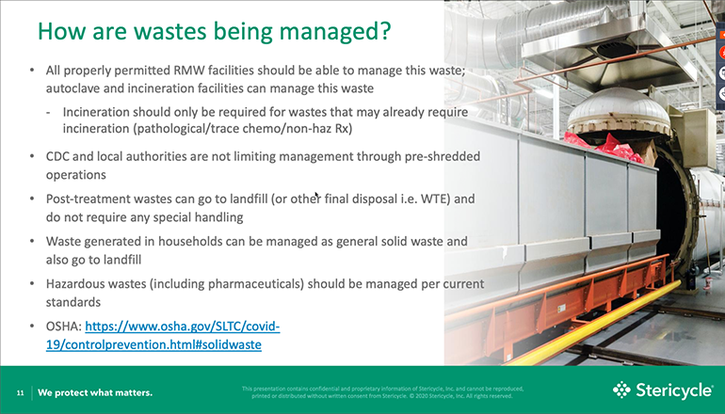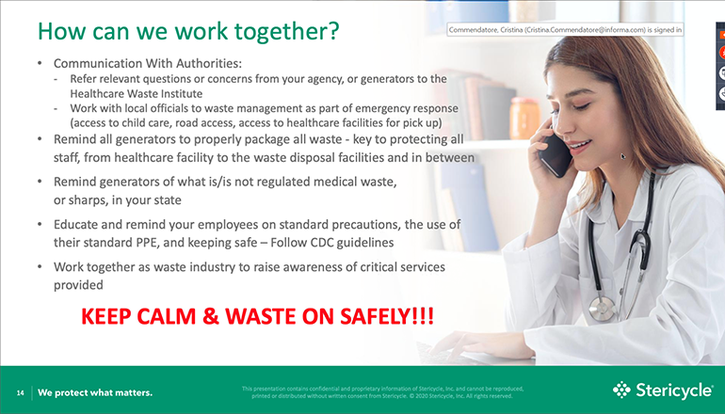Managing COVID-19 Waste: Guidance Amid a Global Pandemic
Stericycle participated in NWRA’s March 19 webinar, “Managing COVID-19 Waste,” to discuss the safe handling of waste during this pandemic.

COVID-19, the new strain from the coronavirus family, has certainly caught the world’s attention. That is primarily because when COVID-19 was identified, one in five people infected with the virus required hospitalization, explained Selin Hoboy, vice president of government affairs and compliance for Stericycle.
Hoboy joined the National Waste & Recycling Association (NWRA) for NWRA’s March 19 webinar, “Managing COVID-19 Waste,” to discuss the safe handling of waste during this global pandemic.
Hoboy, who has been working with Stericycle since 2000 and formerly served as chairman of NWRA’s Healthcare Waste Institute, emphasized that per Centers for Disease Control (CDC) and Occupational Safety and Health Administration (OSHA) guidelines, normal disinfection methods and processes used for medical waste are effective when dealing with COVID-19 waste.
The CDC recommends that waste workers follow infection control measures by utilizing proper personal protection equipment (PPE), such as gloves and eye protection. CDC recommends that those working in close proximity to COVID-19 patients take it a step further and use airborne precautions. CDC and OSHA also recommend standard operational controls and PPE for waste workers.

“I think that this is a good thing because in times of high stress and when people are in circumstances of the unknown and uncertainties, they get stressed out and can make mistakes,” Hoboy pointed out. “So, if you’re also adding changes to what their normal routine is, it can cause more issues. Having that muscle memory of putting on your gloves or safety glasses and your other PPE every day should really be a better way for us to go.”
Waste Generators and the COVID-19 Waste Generated
In healthcare, regular medical waste and sharps are being generated amid the COVID-19 pandemic, but it’s minimal, explained Hoboy during the webinar.
“We are not seeing a high volume of waste that is generated by the patients themselves. When we look at this compared to Ebola, the patients had a lot of blood and bodily fluids that were generated that had to be dealt with. In this case, we are seeing a lot of personal protective equipment and solid waste that’s being included in the medical waste,” she said.
Hoboy noted that Stericycle is seeing a lot of decontamination materials from the healthcare environment due to increased cleaning efforts. Materials from healthcare facilities where there are COVID-19-positive patients are being treated as regulated medical waste. However, areas with no positive patients are not considered regulated medical waste but being treated as solid waste.
“Our recommendation, though, is to make sure you are checking with your local solid waste and health departments to be sure that they haven’t changed something in their rules because there is a lot evolving,” she pointed out.
Lab waste is currently being managed as normal regulated medical waste. However, waste like cultures coming from research labs might be handled differently.
Quarantine sites where people are coming back from foreign companies are oftentimes being overclassified as regulated medical waste, explained Hoboy. However, they may be managed as regular solid waste depending on the state, she said.
Regarding the travel industry—i.e. planes and cruise ships—solid waste is also being treated as regulated medical waste, particularly from the cruise ships where there have been COVID-19-positive individuals on board. The challenge here, according to Hoboy, is that this waste is regulated by the U.S. United States Department of Agriculture’s (USDA) Animal and Plant Health Inspection Service regulations, which require additional decontamination.
“Our recommendation would be to work with local health departments and ensure that the USDA is also informed of how these wastes are being managed,” she added.

With businesses, schools and retail shops, a lot of cleaning and disinfecting is occurring on a greater scale right now. Stericycle recommends that if there is not a COVID-19-positive person at the workplace, then these materials are not necessarily considered regulated medical waste. Depending on the decontamination material being used, there might be other regulations that apply, especially for the PPE from the workers who are applying the decontaminants, said Hoboy.
Lastly, there is household waste.
“Many patients are being told that there is not testing available and to isolate at home. In these cases, we recommend that the patients are taking that material and putting it into rigid, sturdy bags or taking smaller bags and putting them into a larger, sturdier bag for final disposal into the solid waste stream,” explained Hoboy. “We recommend that those bags are properly closed all the way through before being placed in the solid waste stream.”
Currently, there are no additional or more stringent regulatory requirements. Both OSHA and CDC say this material can be managed per the current systems.
Stericycle recommends that residents follow the U.S. Department of Transportation (DOT) packaging requirements, making sure that they are tying off bags, which is critical to mitigate any potential exposure for waste workers.
“At first, at Stericycle, we required only corrugated disposable containers be used,” noted Hoboy. “We wanted it to be marked with a ‘C’ and put it up in the front of the line to make sure it got disposed of right away. We were originally recommending that reusable sharps containers be placed into the red bag and be disposed of. But after continuous discussions with CDC, OSHA, DOT and other international agencies, the recommendation from them was that this is no different than the types of waste that we see every day and that we handle safely every day.”
“After much discussion, we went back to the normal packaging requirements per DOT regulations; the only main change we are making is, per CDC’s guidance, we are asking that hospitals let us know which rooms to avoid for in-service to make sure there aren’t any exposures to COVID-19 patients,” she added.
Latest Guidance and Work from NWRA
This week, OSHA released its latest guidance for solid waste:
Municipal Waste: Workers and employers should manage municipal (e.g., household, business) solid waste with potential or known COVID-19 contamination like any other non-contaminated municipal waste.
Use typical engineering and administrative controls, safe work practices and PPE, such as puncture-resistant gloves and face and eye protection, to prevent worker exposure to the waste streams (or types of wastes), including any contaminants in the materials, they manage. Such measures can help protect workers from sharps and other items that can cause injuries or exposures to infectious materials.
Medical Waste: For medical waste with potential or known COVID-19 contamination, manage it like any other regulated medical waste. COVID-19 is not a Category A infectious substance.
Use typical engineering and administrative controls, safe work practice and PPE to prevent worker exposure to the waste streams (or types of wastes), including any contaminants in the materials, they manage. Such measures can help protect workers from sharps and other items that can cause injuries or exposures to infectious materials.
Recycling: As with municipal waste, employers and workers in the recycling industry should continue to use typical engineering and administrative controls, safe work practices and PPE to prevent worker exposure to recyclable materials they manage, including any contaminants in the materials.
Wastewater: Coronaviruses are susceptible to the same disinfection conditions in the healthcare setting as other viruses, so current disinfection conditions in wastewater treatment facilities is expected to be sufficient. This includes conditions for practices such as oxidation with hypochlorite (i.e., chlorine bleach) and peracetic acid, as well as inactivation using ultraviolet irradiation.
During NWRA’s webinar, Anne Germain, chief operating officer and senior vice president of technical and regulatory affairs for NWRA, listed COVID-19 updates and guidance from the association.
“We have a section of our website dedicated to making sure that people have access to COVID-19 resources,” said Germain. “We did publish earlier this month FAQs for safe handling of materials. Regarding OHSA’s latest guidance, NWRA had requested that OSHA add information about municipal waste as well as recycling to its guidance.”
“OSHA has been very specific that workers should manage municipal solid waste and recycling with potential or known COVID-19 contamination just like they would any non-contaminated municipal waste,” she added. “But they do also suggest using typical engineering controls and PPE to protect the workers.”
Here is some of the additional work NWRA has done on behalf of the industry amid the COVID-19 pandemic:
Urged Congress to pass the SBA Lending program.
Urged Congress through multiple letters and calls to include waste collection in the national emergency declaration (for hours of service relief).
Sent a letter to the Federal Motor Carrier Safety Administration (FMCSA) petitioning regulated medical waste exemption from certain parts of FMCSA regulations.
Sent legislative language to Congress to include waste collection haulers in the FMCSA hours of service exemption.
Sent FHWA a letter requesting that the agency provide guidance to states around weights.
Sent a letter requesting that FMCSA issue relief from expiring commercial driver’s licenses, drug and alcohol testing and physicals.
Sent a letter to Vice President Mike Pence requesting regulatory flexibility.
In addition, Germain said NWRA will continue to release further guidance and practices. The association is also developing language with some other congressmen about relief for bad debt.
“Any time there is a disaster, our members are still out there picking up material, and often some of the businesses are unable to pay or are delayed at paying, so we want to ensure we are not left holding the bag, so to speak,” noted Germain.
About the Author
You May Also Like




